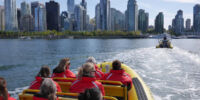
British Columbia. Where stunning natural scenery cascades in every direction, and getting to your destination is an inspiring journey. Thrilling outdoor experiences are found at every turn, and the uniqueness of each community is felt. Cultural values, diversity, and heritage are at the forefront, supporting a wealth of travel stories for years to come.
This is the vision tourism communities across our province are striving towards. With such an abundance of natural assets, and to compete with other tourism destinations, communities, regions, and the province as a whole must focus on the products, experiences, and infrastructure needed to succeed in an extremely competitive landscape.
But how exactly do we achieve this vision, and what does this mean for the future?
Great success stories are built by overcoming challenges along the way. Today, some of those challenges for tourism in BC (for both travelers and residents alike) include transportation access, the availability of trails that are inclusive for people of all abilities, and services/amenities along highway corridors. For industry such as tourism businesses and tour operators, barriers may include a lack of staff in non-peak periods, the costs of upgrades to accommodations, and increasing access to key visitor attractions. With so much room to grow, strong plans are needed to guide our collective efforts and ensure communities are prosperous for years to come.
To shape the long-term growth of tourism in the Kootenay Rockies, a 10-year destination development strategy for the Kootenay Rockies region has been created in partnership with Kootenay Rockies Tourism, Indigenous Tourism BC, Destination BC, and the Ministry of Tourism, Arts and Culture.
“The Kootenay Rockies Destination Development Strategy is the result of in-depth discussions with a wide range of partners in tourism that all share a common vision for the Kootenay Rockies region; a vision of growing our tourism destination sustainably, collaboratively keeping the well-being of our communities, residents, and visitors in mind,” says Kathy Cooper, CEO of Kootenay Rockies Tourism.
The Kootenay Rockies tourism region lies in the southeast of the province, with the Canadian Rockies and Alberta border as its eastern limit and the Columbia Mountains (Purcells, Selkirk, and Monashee Ranges) on the west. The stunning natural assets of the Kootenay Rockies region include majestic mountains, crystal clear lakes, and several mineral hot springs. The area boasts a growing number of world-class trail experiences for hiking, mountain biking, and trail running. The region is also home to some of the highest concentration of ski resorts, heli, cat, and backcountry skiing operations in the world. A wealth of freshwater lakes and rivers provide opportunities for a wide range of paddling and whitewater experiences, along with exceptional fishing conditions.
Destination development planning supports improvements to communities with the overall goal of strengthening the destination and the visitor economy, while enriching the lives of our local residents through the creation of vibrant communities in BC. These 10-year regional destination roadmaps aim to ensure compelling experiences, quality infrastructure and remarkable services to support a prosperous and sustainable visitor economy throughout the province. The Kootenay Rockies Region is starting by focusing on a few key items, including:
- Addressing infrastructure, services, and amenities challenges that support travel quality such as rest stops, lookouts, and boat launches, and more. This will happen by collaborating with stakeholders to create a regional master planning area map of high-use areas and high-sensitivity areas, to be used to inform land management planning processes and other plans for infrastructure development in these areas.
- Improving the ability of tourism businesses to attract, retain, and house skilled staff through the design and execution of regional campaigns to promote tourism career awareness and labour attraction from in and out of province.
- Promoting universal accessibility, meaning improving the accessibility of tourism products for visitors of all abilities, including seniors, young families, and people with access requirements such as those with vision impairment or cognitive difficulties. This will be achieved in the long-term by continuing to work with Spinal Cord BC and hiring a Regional Accessibility Specialist.
- Promoting cultural awareness, meaning supporting the development of Indigenous tourism by working with the Ktunaxa Nation and other Indigenous communities to incorporate oral histories and place names into interpretation and signage where appropriate.
“This roadmap will guide our industry in building upon its strengths and assets and pursuing opportunities, such as improving access and developing new experiences for visitors of all ages and abilities,” continues Cooper. “The Strategy also outlines how to harness the power of collaboration, which is key to ensuring the long-term competitiveness of this region. We are excited to share this plan with all our regional partners and look forward to working towards our goals.”
“The world’s travellers have thousands of places they can choose to go,” says Marsha Walden, CEO of Destination BC. “When they choose to come to British Columbia, they are paying for an experience that needs to be better than those other destinations. That’s what these 10-year destination development strategies can do for communities all across the province,” says Walden. “These strategies ensure we are purposefully and continually investing in better experiences that will make travellers choose BC and recommend us to their friends and family. That’s what will help us grow our thriving visitor economy–an industry that creates so many benefits for the places we live.”
Through the Destination Development Program, and in partnership with Regional Destination Management Organizations and Indigenous Tourism BC, 20 planning area strategies across the province will be created. These 10-year destination development strategies will funnel into six regional strategies, which will ultimately lead into one strategic provincial destination development plan. Working together, these strategies are meant to guide the future growth of tourism in BC through a coordinated approach to allow better alignment of long-term planning and development efforts, leading to increased tourism revenue and visitation to communities around the province.
“British Columbia is fortunate to have a well‐developed network of government and economic development agencies, tourism organizations, a great diversity of tourism sectors, highly engaged communities, and over 19,000 tourism businesses of every size and shape,” says Lisa Beare, Minister for Tourism, Arts & Culture. “By working collaboratively in the creation of Destination Development Strategies, this network is building a powerful competitive advantage in our province. I welcome the development of the Kootenay Rockies Destination Development Strategy to help the region plan for the future, stimulate growth in its tourism activities, create more opportunities for good jobs for people, and attract more visitors to experience our beautiful and exciting province.”
MORE INFORMATION
Quick Links and Facts
- Read the full Kootenay Rockies Regional Destination Development strategy complete with themes and opportunities online
- Download maps of the regions and planning areas
- View the planning area strategy and highlight documents
About Kootenay Rockies Tourism:
Kootenay Rockies Tourism (KRT) is one of BC’s five official Regional Destination Management Organizations (RDMO) and is under contract as a representative of Destination BC (DBC), the Provincial Destination Management Organization (PDMO). KRT has operated since 1978 and represents over 700 tourism businesses and operators. This includes resorts, accommodation properties, wellness retreats, golf, ski, adventure, communities, retail, food & beverage, transportation, arts & culture and attractions.
About Destination BC:
Destination BC is a provincially funded, industry-led Crown corporation that supports a strong and competitive future for BC’s tourism industry through a combination of global marketing, destination development, industry learning, cooperative community-based programs, and visitor servicing. Destination BC receives approximately $52 million each year, out of a Provincial investment of about $140 million in BC’s tourism ecosystem as a whole. These investments help to improve the visitor experience, support businesses and communities, and strengthen BC’s worldwide reputation as a destination of choice. For more information about Destination BC’s programs and services, please visit www.DestinationBC.ca.
Media Contacts:
Kootenay Rockies Tourism
Kathy Cooper, CEO
Emilie Cayer-Huard, Industry and Destination Development Specialist
Destination BC, Media Relations
Media.Relations@DestinationBC.ca





